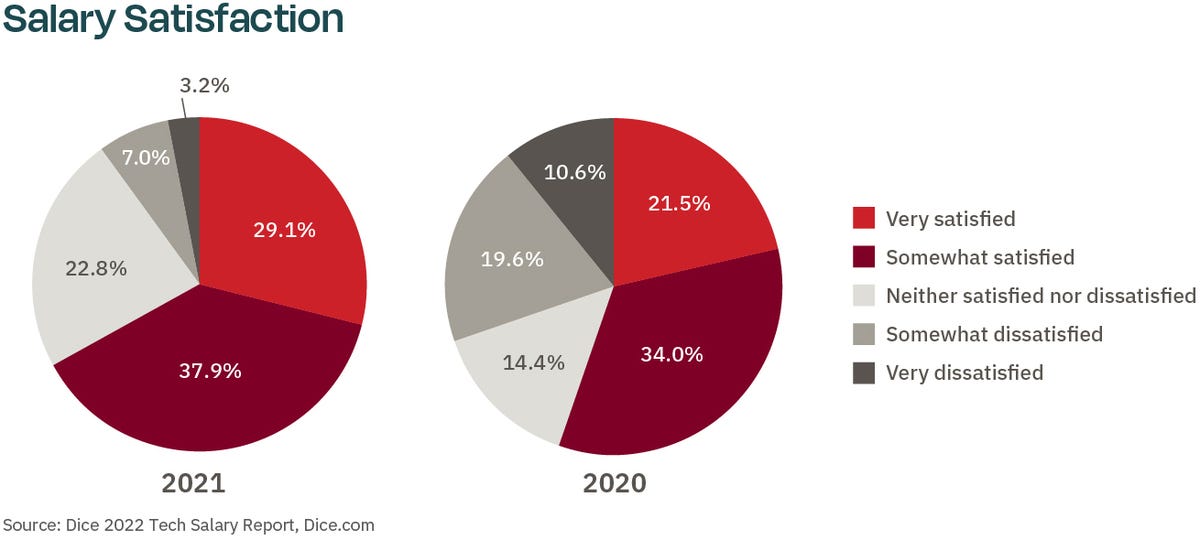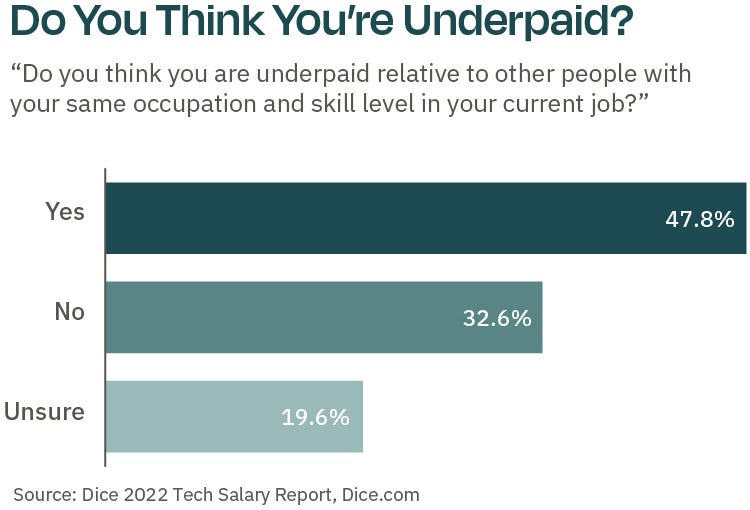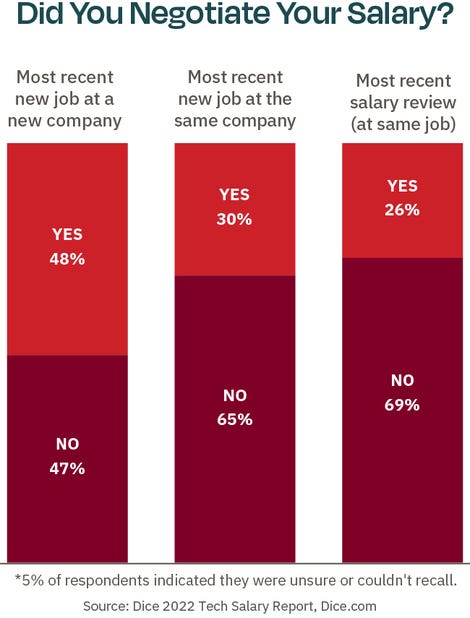Even though tech workers are happier than ever with their pay, nearly half feel they are not fairly compensated.
Written by Owen Hughes, Senior Editor
on January 24, 2022 | Topic: Developer

Salaries for tech workers have hit new highs, but many developers still feel underpaid.
Image: Getty Images/iStockphoto
A "widespread hunger" for technology professionals has see the average salary for technologists in the US hit a record high of $104,566 in 2021 – and yet, nearly half of tech workers feel they are underpaid.
The latest Dice Tech Salary Report found that 61% of technologists received a salary increase last year, up from 52% in 2020. Web developers saw the biggest increase in pay, shooting up by more than a fifth (21.3%) to $98,912, while the highest salaries were demanded by IT management, whose pay rose 6% to $151,983 between 2020 and 2021.
SEE: Developers say they're happier working from home. Managers should take note
Perhaps unsurprisingly, these pay increases translate into greater satisfaction amongst tech workers. Of the more than 7,200 technologists who responded to Dice's survey, 67% reported being either 'very satisfied' or 'somewhat satisfied' with their salary – up from 55.5% in 2020. At the same time, the proportion who reported feeling very or somewhat dissatisfied with their pay dropped from nearly a third (30.2%) in 2020, to just 10.2% last year.
A "widespread hunger" for technology professionals has see the average salary for technologists in the US hit a record high of $104,566 in 2021 – and yet, nearly half of tech workers feel they are underpaid.
The latest Dice Tech Salary Report found that 61% of technologists received a salary increase last year, up from 52% in 2020. Web developers saw the biggest increase in pay, shooting up by more than a fifth (21.3%) to $98,912, while the highest salaries were demanded by IT management, whose pay rose 6% to $151,983 between 2020 and 2021.
SEE: Developers say they're happier working from home. Managers should take note
Perhaps unsurprisingly, these pay increases translate into greater satisfaction amongst tech workers. Of the more than 7,200 technologists who responded to Dice's survey, 67% reported being either 'very satisfied' or 'somewhat satisfied' with their salary – up from 55.5% in 2020. At the same time, the proportion who reported feeling very or somewhat dissatisfied with their pay dropped from nearly a third (30.2%) in 2020, to just 10.2% last year.

Image: Dice.com
But despite rising salaries and greater satisfaction with their pay, tech workers do not feel they are being adequately compensated for their time: 47.8% of survey respondents felt they were underpaid – a marginal increase of nearly 2% compared to 2020.
SEE: Is the tech jobs boom is beginning to cool?
A few factors might be contributing to this, said Dice. For example, the low tech unemployment rate and the ever-increasing number of job vacancies may have led technologists to re-evaluate their current position. "Tech professionals are themselves or seeing their peers receive large compensation and other benefit increases as enticements to leave their current roles for another organization," Dice CEO, Art Zeile, told ZDNet.
"The close-to-historic low tech unemployment rate and the skyrocketing demand for technologists have created an environment in which technologists with varied levels of skills and experiences are being wooed by organizations that can afford to pay a premium, and that's likely driving some of the dissatisfaction in pay."

Image: Dice.com
There is also dissatisfaction among women about their salaries. Dice's 2021 Equality in Tech Report showed that some 35% of women reported dissatisfaction with their current compensation, and 49% of women reported feeling underpaid relative to their male counterparts.
Despite technologists feeling underpaid, most are not fighting for pay rises. When asked whether they negotiated their compensation at their most recent salary review, 69% of respondents to Dice's survey replied 'No'.
This compares to 48% of tech workers who negotiated their salary for a new job at a new company. The main reason given by 10% of respondents who reported receiving a salary decrease in 2021 was because they changed employers.

Image: Dice.com
Pay isn't everything, however: alongside staple benefits, such as paid vacation days, health and dental care, and paid sick days, tech workers also increasingly want employers to offer more flexible work schedules, training and remote-working stipends, and childcare support.
Zeile said these findings were "not only a reflection of an organization's adjustment to the future of work," but also highlighted areas where organizations could be competitive in attracting and retaining talent.
"For organizations to attract talent in an ultra-competitive market, one of the most important components is to take the time to truly understand what technologists want and need in their ideal work environments and cultures, and that means starting to close the gap between the benefits that are important to employees versus what they're being offered."
No comments:
Post a Comment